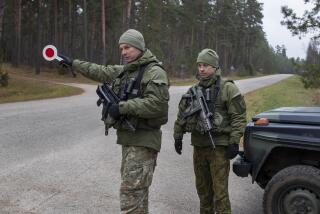Lithuania Acts to Overcome Oil Blockade : Baltics: The republic prepares to receive foreign tankers and taps its own fields.
- Share via
MOSCOW — Lithuania said Friday that it is stepping up efforts to break a Kremlin oil blockade, preparing its port to receive foreign tankers and for the first time exploiting its own oil reserves.
Oil Minister Leonas Asmantas said talks were under way with oil suppliers in Saudi Arabia, Denmark and North America, and that the republic’s port at Klaipeda would be ready to take deliveries starting next week.
Lithuania is also starting to produce oil from a small field at Kretinga in the northwest of the republic and to study offshore reserves in an attempt to end its heavy dependence on imported Soviet supplies, he said.
“We hope the port will be open within the next few days,” Asmantas said by telephone from the Lithuanian capital, Vilnius. “Talks are under way with these countries but no contract has yet been signed.”
However, much would depend on whether the republic receives foreign credits with which to pay for the oil, he said.
Lithuanian Prime Minister Kazimiera Prunskiene said this week that the republic would run out of crude oil by May 25 as a result of the Kremlin blockade.
Moscow imposed the blockade in a bid to force Lithuania to rescind its March 11 declaration of independence.
The blockade has forced the closure of Lithuania’s sole refinery at Mazeikiai, which was formerly processing about 12 million tons of oil a year, Asmantas said.
Gasoline is rationed in Lithuania and is in chronic short supply in the neighboring republics of Estonia and Latvia, which also used to receive supplies from the refinery.
Lithuania’s oil consumption, which had been running at about 16,600 tons a day, has been halved as a result of economy measures introduced since the blockade, he said.
Local industry has laid off at least 20,000 workers.
Meanwhile, the presidents of Lithuania, Estonia and Latvia prepared for today’s summit meeting in which they will seek to coordinate their policies toward Moscow.
“We’re looking for as close cooperation as possible to find a suitable solution for the Baltic states, beneficial to all of us. We do not want to create undue conflict,” said Endel Lippmaa, Estonian minister without portfolio.
The meeting, to be held in the Estonian capital of Tallinn, will be the first between the three presidents since independence-seeking movements won power in elections in the three Baltic republics earlier this year.
Estonia and Latvia fear that, unless they join in a common stand, they will be subjected to economic sanctions by Moscow like those imposed against Lithuania.
The Kremlin was reported Friday to have taken its first steps against Latvia and Estonia, stopping transfers of hard currency to those two republics as well as Lithuania.
In Latvia, food rationing plans were announced.
More to Read
Sign up for Essential California
The most important California stories and recommendations in your inbox every morning.
You may occasionally receive promotional content from the Los Angeles Times.













